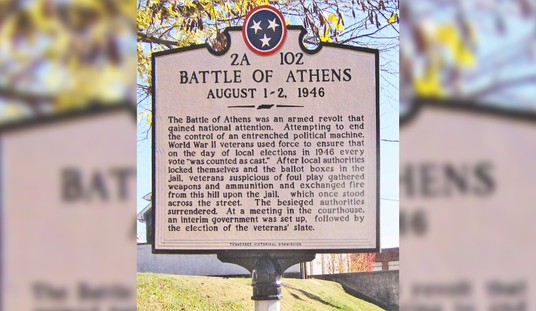Back in November, I quipped that at some point, the Gray Lady of the New York Times slowly morphed into the vapor-filled dowager form of Margaret Dumont, the Marx Brother’s hilariously straitlaced comic foil, but without Dumont’s grand sense of irony and whit.
While we’ve had some fun with Paul Krugman this week (and welcome to the readers from Ricochet who joined in as well yesterday), in the latest edition of the Weekly Standard, P.J. O’Rourke writes that plenty of other Timesmen caught a severe case of the vapors as well in the wake of last Saturday’s shooting in Tucson:
Hulse and Zernike pause and duly note, “Tea Party activists also condemned the shooting.” Nice use of also.
Then they’re off again, into the jump, for a total of more than 18 column inches of “protesters outside the House hurling insults and slurs . . . ” “Sarah Palin’s political action committee with cross hairs . . . ” “Republican candidates seemed to raise the prospect of armed revolt . . . ” and “other Tea Party activists said it would be hard to separate the shooting in Tucson from the current ideological clash.”
Hulse and Zernike have the nerve to end with a quote from one of the “other Tea Party activists,” Judson Phillips, founder of Tea Party Nation: “Violence of this nature should be decried by everyone and not used for political gain.” Left unprinted are descriptions of Hulse and Zernike smirking.
A great deal of other ugly and offensive writing went off on a tangent from the crime scene and wound up published in the Sunday New York Times.
Some was in the guise of commentary, such as Matt Bai’s dredging up of a quip by Sharron Angle, “I hope we’re not getting to Second Amendment remedies.” Gabrielle Giffords is a gun rights advocate.
Some was in the news coverage: “Democrats denounced the fierce partisan atmosphere in Ms. Giffords’s district.” Voters in that conservative locale chose Giffords over a GOP candidate backed by Tea Party supporters.
Worse came in Monday’s Times. News analyst Jennifer Steinhauer wrote, “Arizona has shifted from a place on the political fringe to a symbol of a nation whose political discourse has lost its way.” It’s worth remembering that another place the Times considers to be on the political fringe is Staten Island.
Editorialized the Times: “It is legitimate to hold Republicans and particularly their most virulent supporters in the media responsible for the gale of anger that has produced the vast majority of these threats.” Interesting how a few small changes would make that sentence appall the Times as much as the Times appalls me: “It is legitimate to hold Muslims and particularly their most virulent supporters in the media responsible for the gale of anger that has produced 9/11.”
The most cringe-inducing article was titled “In the Shock of the Moment, the Politicking Stops . . . Until It Doesn’t.” Jeff Zeleny and Jim Rutenberg wrote, “Some Democrats were urging [President Obama] to look back to recent history, when President Bill Clinton seized the political high ground after the 1995 Oklahoma City bombing.”
In the matter of self-serving, bitter, calculated cynicism, there wouldn’t seem to be much left to prove against the Times. Judging by what I’ve heard from my fellow conservatives, the issue is decided. The New York Times is a worthless, truthless, vicious institution. But I disagree. I think things are worse than that.
A reaction so disproportionate and immaterial to a news story by a news organization is indicative of trouble in the body politic—trouble almost as severe as that which the Times claims the Giffords shooting indicates. I worry that in the tremors and hysteria of the Times we’re seeing the sad end of liberalism.
Its passing is to be mourned, perhaps most by true conservatives. -Civilization owes a debt to liberal politics. From the Reform Act and the religious emancipation fight of the British Whigs to the American civil rights movement, liberals have in fact held positions on political high ground (though not during Clinton’s exploitation of the Oklahoma City bombing). Liberals have seen government as a force for good, and sometimes it can be. World War II comes to mind. While conservatives have delighted in the free market, liberals have been there to remind us that all freedoms, including market freedoms, entail responsibilities. At the very least it can be said that we conservatives would not be so upright in our ideals if we hadn’t been pushing against liberals.
But liberalism, as personified by the New York Times, became a dotty old aunt sometime during the Johnson administration. She’s provincial, eccentric, and holds dull, peculiar views about the world. Still, she has our fond regard, and we visit her regularly in her nursing home otherwise known as Arts and Leisure and the Book Review. Or we did until Sunday, January 9, when she began spouting obscenities and exposing herself.
How the Times went off the rails is the subject of William McGowan’s must-read new book, Gray Lady Down. Given that the paper has long been the house organ of American liberalism, in National Review this week (behind the subscription firewall for now, but hopefully will be online to all soon), Glenn Reynolds concurs with O’Rourke’s assessment about what the paper’s excesses say about the sorry state of liberalism in general:
As I read the book, this piling up of disaster stories sometimes felt like overkill, but it was not: McGowan deploys the sheer repetitiveness of the problems as a way of making clear that they are systemic ones, not just the result of a few bad actors or bad decisions. And there lies the most troubling aspect of McGowan’s book: The systemic problem goes beyond the Times.
Were it simply that Arthur “Pinch” Sulzberger Jr. is a bad manager and editor, the story here would be a simple one. But although he is certainly both, the Times’ problems seem to embody not just Pinch’s personal failings, but also the failings of a generation of American intellectual and political leaders.
If there is a single lesson to be taken from McGowan’s book, it is that the maintenance of great institutions takes constant effort and a considerable degree of self-denial: an ability to restrain one’s own short-term selfish impulses, and those of colleagues, in order to allow the institution to do its job. A second lesson is that those of Pinch’s generation, America’s own ’68ers, don’t care much for maintenance or self-denial.
Pinch’s political attitudes — from his simplistic Vietnam War stance, to his knee-jerk racial views, to his assumption that any out-group must be supported — are pretty much a caricature of the upper-class Sixties New Left. So is his cavalier attitude toward finances, and toward the views of those paying the bills. Those are, alas, also the attitudes of those currently in charge in Washington. In reading Gray Lady Down, I felt that I was reading, in miniature, the story of America under the present administration. Like the Times, we wonder what we will do when the loaned foreign billions run out, and like the Times, we wonder why the man at the top seems so unconcerned and aloof.
When I started reading McGowan’s book, I wondered who would turn the Times around. By the time I finished, I was wondering: Who will turn America around?
Well, there’s always America’s fine public school system…
(H/T: 5’F)
Update:As Hot Air notes, “NYT still dropping hints about Loughner and right-wing extremists.”










Join the conversation as a VIP Member